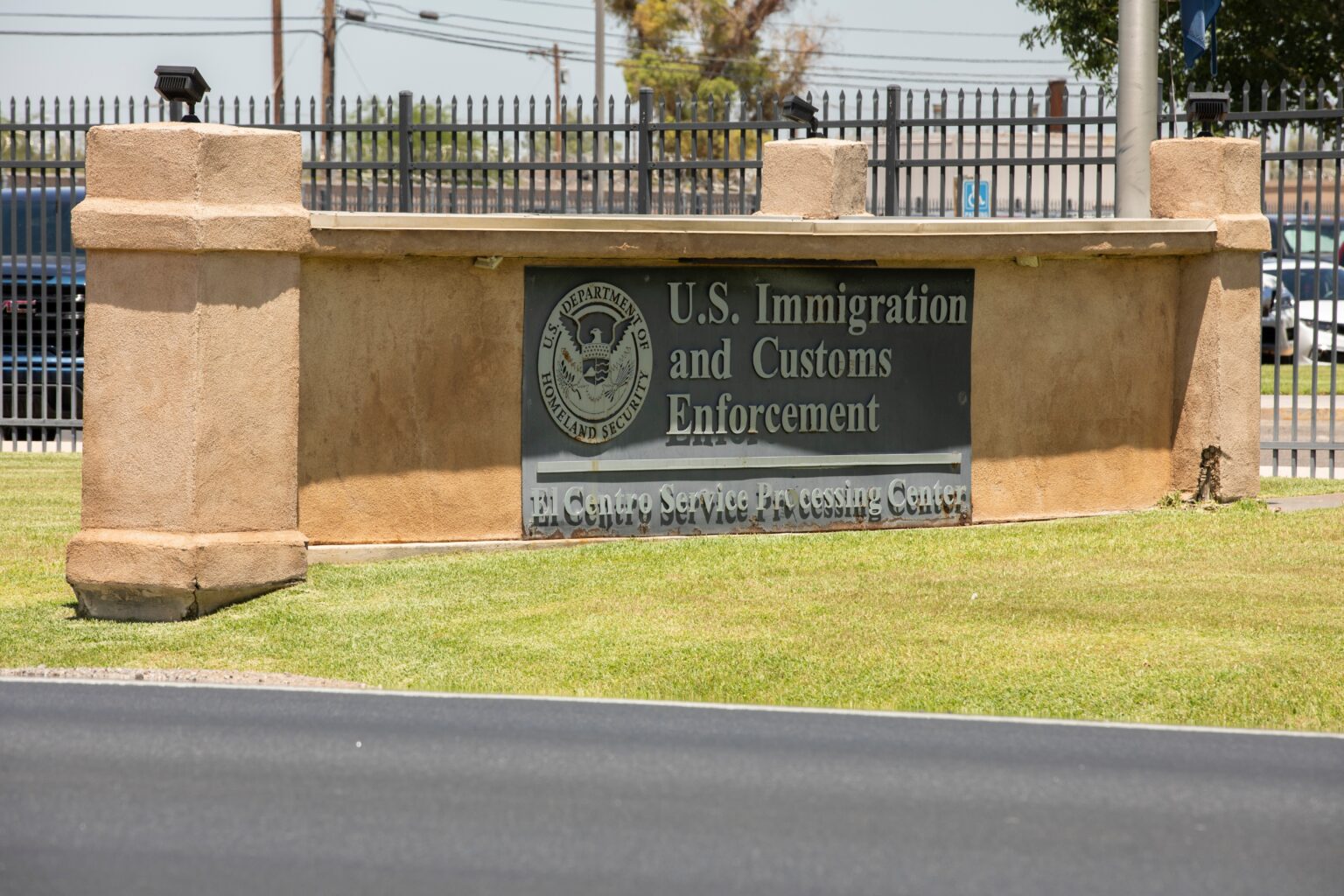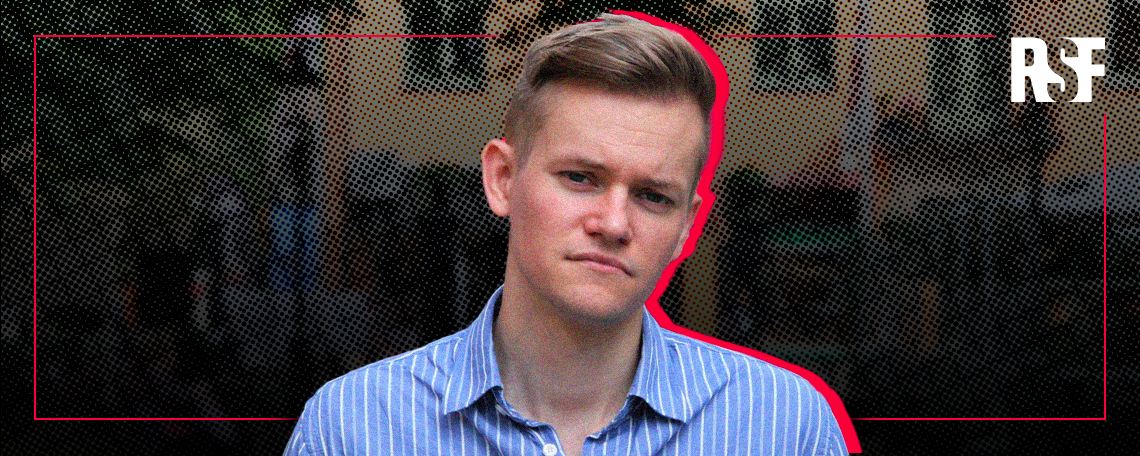
Americans largely foresee AI having negative effects on news, journalists
April 28, 2025
Tracking US Migrant Detention Data: What Journalists Need to Understand
April 30, 2025Joakim Medin, special correspondent for the Swedish media Dagens ETC, has been held since 30 March in the high-security Marmara prison in the Silivri district of Istanbul and will appear in court on 30 April. Reporters Without Borders (RSF) calls on the authorities to release the journalist, who specialises in Kurdish issues, and to end the crackdown on news professionals.
Arrested on 27 March upon his arrival in Istanbul, Joakim Medin has been accused of “insulting the president,” Recep Tayyip Erdogan, “belonging to an armed terrorist organisation,” and “spreading terrorist propaganda.” The charges are linked to his presence at a pro-PKK rally he was covering as a journalist in Stockholm in 2023, and his travels to Kurdish regions. On 30 April, he will virtually attend his first hearing at the Criminal Court of First Instance of Ankara from prison for the first charge of “insulting the President,” which is often used to silence journalists critical of the authorities. His combined charges could land him in prison for over 27 years.
“The article of law that criminalises ‘insulting the President’ disregards international human rights standards and has led to the arrest and prosecution of Swedish journalist Joakim Medin — and many other journalists from Türkiye. We call on the authorities to free Medin, who has been arbitrarily detained for a month, and all the journalists unjustly held behind bars.
The freelance journalist was travelling to Istanbul to cover the pro-democracy protests, and the evidence strongly suggests that his arrest and detention are linked to his journalism. What stories was he reporting that were so controversial they landed him in jail? Ivar Anderson, Swedish author and reporter at Byggnadsarbetaren,profiled Joakim Medin for RSF:
“He’s not a desk journalist. He wore out the soles of his shoes.”
Joakim Medin’s career began in 2009, when he travelled to Honduras and stumbled on a military coup — and immediately grabbed his camera. “He’s not a desk journalist. He wore out the soles of his shoes,” described one of his colleagues.Joakim Medin never planned on becoming a journalist: he left his hometown of Mölndal to study in Uppsala to become a high school teacher, landing his first job in the nearby city of Enköping teaching history and civics. But the wider world beckoned, and in 2009, he took a leave of absence to travel through Latin America.
By pure chance, Joakim happened to be in Honduras when the military ousted the country’s democratically elected president, Manuel Zelaya. “As someone fascinated by history, he’s always been driven to understand the world around him,” says Joakim’s wife, Sofie Axelsson.
“In Honduras, he suddenly found himself at the heart of historic events. He met an American journalist who needed a photographer. Joakim just happened to have a camera with him. That’s when he took on his first assignment — and found his true calling.” For a few days, Honduras commanded the world’s attention. The headlines eventually moved on, but the experience stayed with Joakim.
A commitment to international journalism
Back in Sweden, he reported on domestic issues, but international journalism had the strongest pull on him. He often remained on the ground long after other reporters had left, returning to the same subjects again and again. “He’s like a badger — he bites down and doesn’t let go,” says Martin Schibbye, founder of then who has also been imprisoned for his reporting. “Joakim is incredibly tenacious, deeply committed to journalism and to telling the stories that matter. And he has paid a price for that determination — continuing to report even when it became difficult or dangerous.”
Perhaps it is this stubbornness, this insistence on staying, that has made books his signature format. Publishing one book is not unusual for a journalist. Publishing several, within 15 years, is rare. “He latches on to a subject and works it to the core — like in Kurdspåret, the book we released in 2023,” said his publisher, Kristian Borg from Verbal Förlag. “It was an investigative piece about an issue most major newsrooms had long lost interest in […] the story was considered over. But Joakim kept digging. He was later nominated for the prestigious Guldspaden award — which says something about his dedication.”
A curious, independent and ambitious journalist
Joakim has also written books on Kurdish autonomy in northern Syria, on the democratic backslide in Hungary, and on Swedish men travelling to Thailand to buy sex. “In Thailandssvenskarna, he worked undercover, infiltrating the ranks of Sweden Democrats who were buying sex — trying to understand their thinking, their motivations,” said Kristian Borg. “He would never have gained that kind of access through conventional interviews. Yet he never judges in his reporting […] He observes, analyses, and gets close to his subjects. Then he leaves it to the reader to draw conclusions.” At Amnesty Press, where Joakim has been a contributing writer for years, editor Ira Mallik describes him as a curious, independent and ambitious journalist. “For us, he’s reported on people being stripped of their rights. The bitter irony now is that he himself is subjected to exactly the kind of repression he used to cover. It paints a stark picture of the global state of press and free speech,” she said.
Arrested for his work in Syria
Since the day of his arrest on 27 March, Joakim has been held in a Turkish prison. He stands accused of insulting President Recep Tayyip Erdoğan and of belonging to a terrorist organisation. By international standards, Joakim is innocent. He has done nothing but his job: reporting. Yet according to the judges’ interpretation, simply covering a protest critical of the government can be grounds for criminal charges. Interviewing the representatives of banned organisations — even for journalistic purposes — risks being labelled as terrorism. This is not the first time Joakim has been detained for doing his work. In 2015, he was arrested in Syria and spent a week in the Syrian regime’s prisons. Back then, Joakim was still relatively unknown, and dark corners of the internet festered with malicious rumours — claiming he wasn’t a “real” journalist, painting him as a reckless adventurer with a “Tintin complexion.” After returning home, Joakim addressed the hate in a blog post: “I am a journalist — passionate and still idealistic — and if my fringe resembles Tintin’s, well, so be it.”
Chasing stories, facing prison
Today, a decade later, he is a respected foreign correspondent. Yet troll accounts and even elected politicians continue to spread false claims about him, while others speculate endlessly about Türkiye’s motives. Ira Mallik warns that such speculation is a dead end. “All these theories about Joakim distract from the real issue. The focus must stay on Türkiye. This is not about what Joakim has done — it’s about Türkiye’s attitude towards press freedom and free speech,” she said. His close friend, Christoffer Hjalmarsson, a former freelance photojournalist, recalls how he and Joakim often discussed reporting trips together. “I wanted him to come to Syria with me,” Hjalmarsson said, “But he warned me that the assignment I was proposing was pure suicide. Joakim never chased front-line drama. His reporting on conflict has always been about the people, not the gunfire.” Today, Hjalmarsson works at Swedish Television (SVT). While many journalists dream of the stability a staff job offers, Joakim chose to remain freelance — to pursue the stories he truly cared about. “Joakim always aimed to keep his life light — no loans, few ties at home — so he could stay mobile,” says Hjalmarsson. “I looked for security. Joakim kept looking for a way to keep doing what he saw as his mission.” Martin Schibbye describes Joakim simply: “He’s not a desk journalist. He wore out the soles of his shoes.”
Yet perhaps Joakim was ready, finally, for a less itinerant life. He met Sofie Axelsson while both were summer reporters at Dagens ETC, and the two married last year. Today, she holds a staff position at Dagens ETC while he continues freelancing. “He’s driven by a desire to tell important stories, especially for those who have no voice,” Sofie says. “And maintaining that freedom has been crucial for him. But we had planned for him to scale back the foreign assignments.” Their first child — a daughter — is due on 19 July. Will Joakim be home by then? Or will he still be sitting in a prison cell in Istanbul, punished for the “crime” of independent journalism? “Of course I’m worried,” says Sofie. “But I haven’t let myself think that far ahead yet. I’m trying to take it day by day.”
https://rsf.org/en/who-joakim-medin-swedish-journalist-who-could-face-over-27-years-turkish-prison

